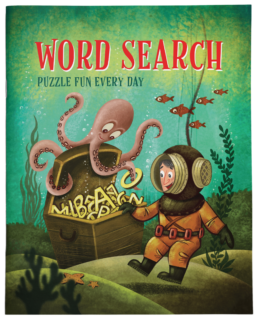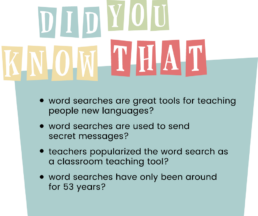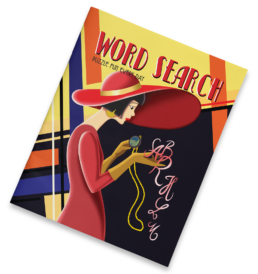Understanding
Word Search Puzzles
Everything You Need to Know About This Popular Word Puzzle
There’s no better feeling than finding a difficult word in a sea of letters and finally finishing that word search you’ve been working on for hours. But as you scan those jumbled letters for fully formed words, have you ever thought about the history behind these fun puzzles and how they benefit your health?
No, just us? Either way, now that we’ve piqued your interest, let’s take a deep dive into the world of word search puzzles, including how they came to be, the brain health benefits they offer, and even strategies to help you solve them.
Let’s get into it!

What Are Word Search Puzzles
& What is the History Behind Them?
A Word Search, also known as word find, word seek, word sleuth, or mystery word puzzle, is a type of word puzzle that consists of words placed amongst random letters in a grid. Words are strategically placed in a horizontal, vertical, or horizontal line. The goal is to find all of the words in the puzzle, which are indicated below the puzzle. Quite often, the puzzle will have a specific theme, with all of the hidden words relating to that theme. Examples include animals, history, science, pop culture, etc.
While it may feel like word searches have been around forever, they actually date back to the 1960s – 1968 to be precise.

The first-ever word search was designed by Norman E. Gibat and published in the Selenby Digest on March 1, 1968, in Norman, Oklahoma. The theme of the first-ever word search was cities in Oklahoma.
Gibat had created the puzzle with the intention of engaging readers of the Selenby Digest. He wanted to find a way to set the Digest apart from other publications and thought that the word search puzzle was something people could enjoy while waiting in line at the supermarket.
The word search quickly took off and became incredibly popular locally in Oklahoma, especially among teachers. In fact, teachers in Norman loved the puzzles so much that many requested reprints that they could give to their students to use as educational tools.
The word search then became a national phenomenon when one teacher sent the puzzles to various friends and teachers across the United States, and the rest is history.
Unfortunately, the word search was not enough to keep the Selenby Digest afloat, and the publication closed up shop two years later in 1970. Norman E. Gibat never published another word search after the publication shut down.
However, its legacy lives on, as the word search puzzle became a massive success that would go on to be enjoyed by millions of people worldwide.
He Said, He Said – Who is the True Inventor of the Word Search?
It’s important to note that while Norman E. Gibat is often credited as the inventor of the word search, this has been contested by Spanish puzzle maker Pedro Ocón de Oro.
Sometime during the 1960s, Ocón de Oro created a word puzzle called Sopa de Letras, which translates to Soup of Letters, which is very similar to what we now know as a word search.
While historians have not been able to determine the exact year that Ocón de Oro created the Sopa de Letras puzzle, the consensus is that it did take place sometime during the 1960s. Because historians have been unable to confirm the exact date, Norman E. Gibat is often credited as the true inventor. However, that’s not to say that he wasn’t inspired by the Spanish puzzle maker.

What Are Word Search Puzzles
& What is the History Behind Them?
A Word Search, also known as word find, word seek, word sleuth, or mystery word puzzle, is a type of word puzzle that consists of words placed amongst random letters in a grid. Words are strategically placed in a horizontal, vertical, or horizontal line. The goal is to find all of the words in the puzzle, which are indicated below the puzzle. Quite often, the puzzle will have a specific theme, with all of the hidden words relating to that theme. Examples include animals, history, science, pop culture, etc.
While it may feel like word searches have been around forever, they actually date back to the 1960s – 1968 to be precise.
The first-ever word search was designed by Norman E. Gibat and published in the Selenby Digest on March 1, 1968, in Norman, Oklahoma. The theme of the first-ever word search was cities in Oklahoma.
Gibat had created the puzzle with the intention of engaging readers of the Selenby Digest. He wanted to find a way to set the Digest apart from other publications and thought that the word search puzzle was something people could enjoy while waiting in line at the supermarket.
The word search quickly took off and became incredibly popular locally in Oklahoma, especially among teachers. In fact, teachers in Norman loved the puzzles so much that many requested reprints that they could give to their students to use as educational tools.
The word search then became a national phenomenon when one teacher sent the puzzles to various friends and teachers across the United States, and the rest is history.
Unfortunately, the word search was not enough to keep the Selenby Digest afloat, and the publication closed up shop two years later in 1970. Norman E. Gibat never published another word search after the publication shut down.
However, its legacy lives on, as the word search puzzle became a massive success that would go on to be enjoyed by millions of people worldwide.
He Said, He Said – Who is the True Inventor of the Word Search?
It’s important to note that while Norman E. Gibat is often credited as the inventor of the word search, this has been contested by Spanish puzzle maker Pedro Ocón de Oro.
Sometime during the 1960s, Ocón de Oro created a word puzzle called Sopa de Letras, which translates to Soup of Letters, which is very similar to what we now know as a word search.
While historians have not been able to determine the exact year that Ocón de Oro created the Sopa de Letras puzzle, the consensus is that it did take place sometime during the 1960s. Because historians have been unable to confirm the exact date, Norman E. Gibat is often credited as the true inventor. However, that’s not to say that he wasn’t inspired by the Spanish puzzle maker.

Brain Health Benefits of Word Searches
Did you know that word search puzzles aren’t just fun, but they also offer numerous brain health benefits? Some of the most significant brain health benefits include:
Improved Memory
Word searches require a fair amount of memory recall, which helps to boost working memory and brain health in both children and seniors.
Reduced Stress
Working on a word search or other word puzzle for just 15 minutes a day is a great way to relax and unwind. Giving your brain something to focus on outside of your day-to-day life and responsibilities helps you to de-stress and forget about stressful events for a little while.
Improved Focus and Productivity
Word searches require your brain to focus on the task at hand while thinking quickly, which can help improve thinking patterns and productivity.
What is the Secret to Solving Tough Word Searches?
Stuck on a really tough word search? Don’t give up just yet! Here are some tried and true strategies to help you complete the toughest of word searches.
Don’t Look at the Word List
This might sound crazy, but hear us out. Try ignoring the word list and looking for words on your own. When you focus too hard to find the words listed in front of you, you often end up overlooking a lot of words.
Some additional words of advice: Small words (three or four letters) are not used as often and may have been included unintentionally, so be careful.
Another tip is to search horizontally and vertically line by line in one direction first, then the other.
Don’t Focus On One Word at a Time
When you put too much effort into one word, it tires out your brain and you may end up overlooking what’s right in front of you. Instead, pick at least three words to look for at the same time.
Switch Directions
Try turning the puzzle upside down or sideways to get a different perspective. You’d be surprised at how effective this can be.
Look Only For Certain Letters
Rather than focusing on trying to find an entire word, look for just the last three letters. This can be incredibly helpful with long, difficult to find words.
Why Wrd Play Word Searches are Different Than Other Puzzles
Looking for a word search that will keep your brain buzzing for hours on end? Our puzzle books have more than enough puzzles to keep you busy for an entire month and are challenging enough to keep you on your toes without going crazy and leaving puzzles unfinished.
All of our puzzle books have the following features:
- Over 60 puzzles per book
- Brand-new, never-before-seen titles
- Quality, bright white paper
- Canadian spelling




